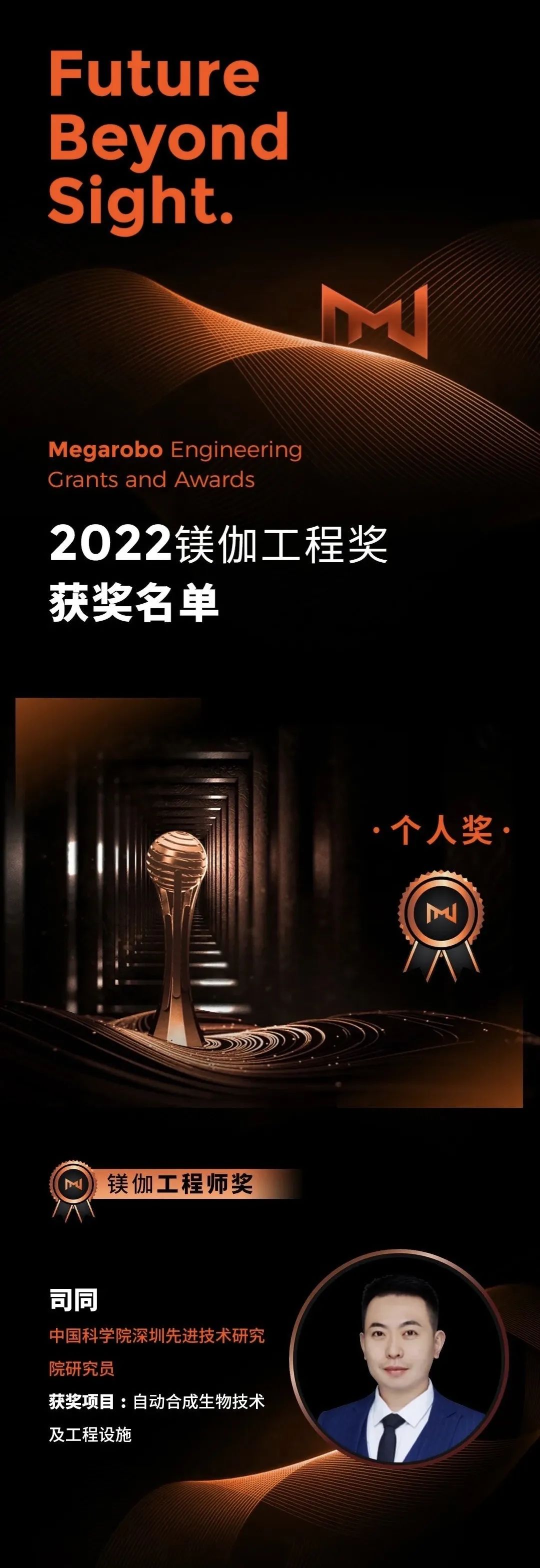
On February 20th, the "2022 Megarobo Engineering Grants and Awards" ceremony was held at the MegaLab in Beijing. The list of awardees was announced with a total of 3 Maga Scientist Awards, 2 Maga Engineer Awards, 2 Maga Science Project Awards, and 1 Maga Engineering Project Award being presented. Researcher Si Tong from the Institute of Synthetic Biology at the Shenzhen Institutes of Advanced Technology, CAS, won the "Megarobo Engineering Grants and Awards".
The Megarobo Engineering Grants and Awards was established in September 2022. The award covers a wide range of directions in life sciences, including synthetic biology, metabolic engineering, genetic engineering, electrochemical synthesis, automated high-throughput screening, artificial intelligence, related equipment development, etc. It sets separate prizes for both individuals and projects.

The award winners of this year all come from well-known domestic universities and research institutions. The awarded projects integrate innovative technologies such as artificial intelligence and automation into scientific research. They achieved breakthroughs in addressing longstanding challenges in energy metabolism regulation, achieving excellent performance in industrial microbial high-throughput screening, building innovative technology platforms for target discovery and verification, and assembling facilities for automated operations in synthetic biology experiments. They have produced outstanding and valuable research results in biology, chemistry, and pharmacy, offering significant theoretical and practical guidance for frontier explorations in the field of life sciences. Maga hopes that by supporting these excellent projects, it can unearth more valuable automated applications, making modest contributions to major challenges faced by humanity such as diseases, resource bottlenecks, and environmental protection, thus promoting more meaningful scientific research outcomes.
Smart automation technology broadly applied to boost the life science industry
The Synthetic Biology Infrastructure constructed under the guidance of Researcher Si Tong integrates automation, informatization, and biotechnology to achieve high-throughput and standardized synthetic biology R&D capabilities, catering to both academic research and industrial application needs. This facility has attracted widespread attention from the industry, university, and research sectors.
The "Major Scientific Infrastructure for Synthetic Biology Research” project (hereinafter referred to as the "Synthetic Biology Infrastructure") is one of the key projects prioritized for startup and layout in Shenzhen's Guangming Science City. With a planned total investment of approximately 2 billion yuan, the Shenzhen Institutes of Advanced Technology of the Chinese Academy of Sciences leads the project. The purpose of the Synthetic Biology Infrastructure is to build an industrialized synthetic biology research platform that serves as both a "cloud laboratory" for users and a "smart laboratory" for operators. It aims to integrate automation, informatization, and biotechnology to achieve high-throughput and standardized synthetic biology R&D capabilities, catering to academic research and industrial application needs. The project's primary construction contents include design learning platform, synthesis testing platform, and user detection platform. Once completed, it will be China's first large-scale smart synthetic biology manufacturing system that integrates software control, hardware equipment, testing feedback, and synthetic biology applications, realizing whole-process highly integrated and fully automated biological manufacturing.